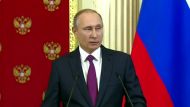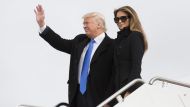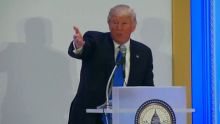Just days before Donald Trump's swearing in as American president, a news report has revealed the remarkable breadth of a joint investigation by no less than six US intelligence agencies of claims that Russia helped the Trump campaign – and of the credibility the agencies attach to information that Trump dismisses as "crap".
Attempting to establish a money trail, rather than pursuing lurid, sensational and unsubstantiated claims that Moscow has a sex tape that could be used to blackmail Trump, the agencies are probing allegations that a system for delivering government pensions to Russians living in the US may have been used as a conduit to pay hackers who breached Democratic Party computers to harvest a trove of emails that were leaked through WikiLeaks to embarrass Hillary Clinton.
More World News Videos
Putin doubts Trump met with Moscow prostitutes
At a news conference in Moscow, Russian President Vladimir Putin says he doubts US President-elect Donald Trump met with prostitutes in a Moscow hotel room, referring to an unverified dossier published last week.
The agencies, according to the McClatchy news service, are the FBI, CIA, National Security Agency, Justice Department, Treasury and National Intelligence Agency. The Senate Intelligence Committee also has launched its own investigation, which will have subpoena power, to investigate Russian interference in the election.
The inter-agency working group is said to have been established early in 2016 – before the FBI received the explosive dossier in which a former senior British intelligence agent reveals the sex-tape allegations – but the dossier also alludes to the Kremlin using the pension payments as cover.
In the first week of January, the director of national intelligence declassified and released a sanitised report on Russian interference in the election, which concludes that Russian President Vladimir Putin authorised a covert campaign to "undermine faith in the US democratic process" – in particular by seeking to damage Clinton's chances of winning and, at the same time, to give Trump a leg-up, by hacking senior Democrats' email and running fake news.
Adding to the intrigue, once Trump swears his oath of office at noon on Friday, his newly appointed intelligence and security chiefs will have ultimate control of the inter-agency group.
The agencies are said to be examining the activities of several Americans linked to the Trump campaign and corporation and a bigger group of Russians and citizens of other ex-Soviet republics who are based in the US who may be linked to Trump.
A separate news report, by the BBC last week, revealed that the investigation was set up after the CIA was told in the northern spring of 2016, by counterparts in one of the formerly Soviet Baltic states, of a tape recording alluding to a Russian plan to channel funds to the US for the express purpose of throwing the election.

Months later, the author of the dossier, veteran MI6 agent and Russia specialist Christopher Steele, reportedly was troubled by allegations from his network of Russian sources on "sweetheart" business deals offered to Trump by rich Russians connected to the Kremlin – Trump insists he has no business deals in Russia.
Steele, whose research was funded first by Trump's Republican opponents and later by his Democratic opponents, was told that Russian consulates in the US distributed "tens of thousands of dollars" to Kremlin-hired hackers who were given false names under which they were recorded as genuine Russian-American pensioners.

Critical to an understanding of the credibility the agencies attach to information from multiple sources is their determination and ultimate success after being rebuffed twice, in getting the highly secretive US Foreign Intelligence Surveillance Court, commonly referred to as the FISA court, to issue a warrant in October 2016 to give them access to bank records and other financial documentation in the US.
Susan Hennessey, formerly a lawyer for the National Security Agency who now is an analyst at the Washington-based Brookings Institution, told McClatchy that such warrants were issued only if agents could demonstrate "probable cause" that a crime has been committed – a claim that would confirm US access to multiple sources of intelligence, because Steele's report seemingly doesn't meet that test.

"If, in fact, law enforcement has obtained a FISA warrant, that is an indication that additional evidence exists outside of the [Steele] dossier," she is quoted.
In June 2016, The FISA court rejected a first application by the Justice Department's national security division for a warrant to authorise interception of electronic records at two Russian banks, the BBC reported.

In the following month the lawyers returned to the FISA court, with a more narrowly framed request – it too was rejected. But just three weeks before the presidential election and Trump's stunning victory, a third, further-refined application was successful.
The court's authorisation to investigate funds moving between Russia and the US reportedly does not name Trump or his associates, but a lawyer familiar with the case, told the BBC that the investigation was focusing on three Trump associates and "it's clear this is about Trump".

Approached by the BBC, the three Trump associates denied any wrongdoing – as did one of the banks. The second bank refused to comment.















